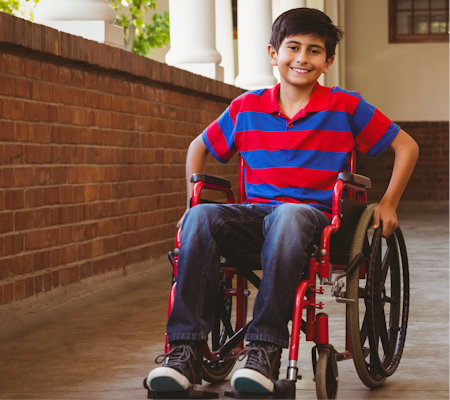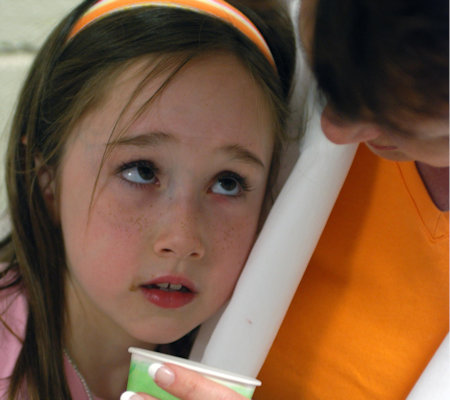Specialized Instructional Support Service Descriptions
NASISP organizations represent more than one million members, including school counselors, school nurses, psychologists, school psychologists, social workers and school social workers; occupational therapists, physical therapists, art therapists, dance/movement therapists, and music therapists; speech-language pathologists; audiologists; in addition to teachers, students, parents, and administrators. The following are descriptions of these professional services:

Art Therapy
Art Therapy Services
In the school setting, art therapy provides opportunities for positive experiences that translate into enhanced classroom functioning and increased ability to benefit from educational services. Art therapists are mental health professionals who work with teachers, parents, school counselors, and school psychologists to coordinate referral, assessment, and treatment. When a student is assessed for art therapy services and is deemed eligible for treatment, the art therapist tailors objectives to support the child’s unique academic and social/emotional requirements, and establishes goals in the Individualized Education Program (IEP). Students in individual art therapy may work toward improved cognitive growth, emotional control, the mastery of sensory-motor skills, and positive adjustment to the classroom experience. Group art therapy allows students to safely express confusing and overwhelming feelings while building a sense of cooperation, community, and interpersonal relatedness. For example, students with disruptive behaviors can contain impulses through art therapy activities. Students with self-esteem problems can establish a positive self-concept through the mastery of art skills. The primary goal is always to help each student reach his or her fullest potential. Consultation with parents, teachers, and other specialized instructional support personnel continues throughout the treatment process. School art therapy services have been successfully used to facilitate students’ abilities to function as effectively as possible within the academic environment. Providers of art therapy services include masters or doctoral level art therapists credentialed by the Art Therapy Credentials Board (ATCB). For more information contact: Cynthia Woodruff, American Art Therapy Association (AATA), (703) 548‐5860. Visit the AATA website at www.arttherapy.org.

Dance/Movement
Dance/Movement Therapy Services
Dance/movement therapy utilizes nonverbal communication, making it an ideal treatment choice for children and adolescents in school settings. Because children and adolescents experience the world through a rapidly changing body, they often communicate their physical, emotional, and cognitive needs on a nonverbal level. As part of an interdisciplinary team, the master’s level dance/movement therapist develops appropriate therapeutic goals to support each child’s academic success. Common treatment goals include improving impulse control, expressing feelings through positive outlets, increasing self-esteem, and improving body image. To address these goals, a dance/movement therapist uses a variety of techniques within the safe and playful environment of a therapy session. These techniques may include rhythmic dance, role-play, body coordination, symbolic movement, and kinesthetic empathy. Individual and group dance/movement therapy services help students cope with physical impairments, learning disabilities, and behavioral issues that can lead to classroom disruption and create tension within family relationships. The dance/movement therapist collaborates with school staff and parents to transfer therapeutic skills to the classroom and home, in order to improve the child’s overall functioning. For more information, contact the American Dance Therapy Association (ADTA) National Office or visit the ADTA website.

Educational Audiology
Educational Audiology Services
Educational audiologists have the unique expertise to support children with hearing loss and auditory processing disorders in accessing classroom curricula. Educational audiologists are trained and licensed to provide a variety of services that include: the fitting and maintenance of technology such as, personal FM and soundfield systems; in-service training, counseling and guidance to support personnel, teachers and parents; participation on IEP teams; diagnostic assessment of hearing loss and auditory processing disorders; earmold modifications and fittings; hearing aid repair and trouble-shooting; functional assessment of classroom performance; hearing screening; hearing conservation education, assessment and management of classroom acoustics and a variety of other services that enhance the ability of the schools to provide access to education for all children, particularly those with hearing disorders. Audiologists hold either a master’s or a doctoral degree and are licensed in their state to practice. ASHA certified audiologists have graduated from an accredited program and have passed a national examination to earn a Certificate of Clinical Competence (CCC) from the American Speech-Language-Hearing Association (ASHA). For information, visit the ASHA website.

Music Therapy
Music Therapy Services
Music Therapy is an established health profession in which music is used to achieve non-music functional goals. Music therapy can facilitate students’ development in cognitive, behavioral, physical, emotional, social, and communication domains. Participation in music therapy can stimulate focus of attention and can serve as a motivation for students to participate more fully in their education. A music therapy assessment conducted by a board certified music therapist provides the IEP team with the information it needs to determine related service eligibility. Music therapy can serve as an integral component in helping the child with special needs attain educational goals identified by his/her IEP team, either through direct or consultant services. One of the purposes of music therapy for students is to provide them with an initial assist using melodic and rhythmic strategies, followed by fading of musical cues to aid in generalization and transfer to other environments. Adapting strategies to encourage a child’s participation in the least restrictive environment, music therapists can support special education classroom teachers by providing effective ways to incorporate music into their academic curriculum and make recommendations to families regarding ways to include successful music therapy techniques in other aspects of the child’s life. Qualified music therapists holding the Music Therapist-Board Certified (MT-BC) credential have completed a bachelor’s, master’s, or doctoral level degree in music therapy, a minimum of 1200 hours of clinical training, and passed the national board certification exam administered by the Certification Board for Music Therapists (CBMT). For more information, contact Judy Simpson, American Music Therapy Association (AMTA) at (301) 589-3300 x105, or Rebecca Smith, AMTA at (301) 589-3300 x108 or visit the AMTA website.

Occupational Therapy
Occupational Therapy Services
Occupational therapy, or OT, is concerned with helping individuals engage in their everyday activities, or “occupations.” For children, this may include getting dressed, participating in school activities, getting along with their siblings and friends, feeding themselves, and completing written tasks. As a related service under Part B of IDEA and a primary service under Part C, OT is interested in helping children and youth utilize existing skills or develop new ones in order to be successful and independent in school, at home, at work, and in their communities. Through the use of meaningful and purposeful activities, occupational therapists and occupational therapy assistants (under the direction and supervision of the occupational therapist), collaborate with other members of the team to identify, modify, design, or implement appropriate strategies and opportunities that lead to accomplishment, mastery, and a sense of purpose in ways that are important and meaningful to the child and their family. For more information, contact Abraham Saffer at (202)450-8068 at the American Occupational Therapy Association (AOTA), or visit the AOTA website.

Physical Therapy
Physical Therapy Services
Physical therapists work collaboratively as a member of the individual education program (IEP) team, to provide assessment, and support evaluation, IEP development and physical therapy services. Physical therapists design and implement interventions with a focus on the movement system (APTA, The Movement System, 2016) and function; interventions may include services to and on behalf of a student to support his/her access to the learning environment, participation in the general education curriculum, and benefit from specialized instruction in order to achieve their IEP goals. The physical therapist assistant (PTA), under the direction and supervision of the physical therapist, aids in the delivery of physical therapy services. For more information contact Kate W. Gilliard, American Physical Therapy Association, or visit the APTA website, Academy of Pediatric Physical Therapy website or the Academy of Physical Therapy website.

Psychological Services
Psychological Services
School-based psychological services in schools combine the science and practice of psychology to help children and youth succeed academically, socially, behaviorally, and emotionally. Providers of psychological services include school psychologists, who have specialized training in education and psychology, as well as other psychologists such as clinical, developmental, counseling, pediatric, and family psychologists. School psychologists and other psychologists provide direct educational and mental health services for children and youth, as well as work with parents, educators, and other professionals to create supportive learning and social environments for all children. These services include psychological assessment, wellness promotion, social emotional learning and positive behavioral interventions and supports, prevention, early identification and intervention to address academic and behavior problems, crisis response, individual, group, and family counseling, consultation with teachers, administrators and families, and program development and evaluation services, with a special focus on the developmental processes of children and youth within the context of schools, families, and other systems. Psychologists and school psychologists promote educationally and psychologically healthy environments for children and their families through research-based, effective programs that prevent unhealthy behaviors, enhance healthy development, and promote optimal learning. For more information, contact Jenny Smulson, American Psychological Association (APA); or Kelly Vaillancourt, National Association of School Psychologists (NASP). Visit the APA website and the NASP website.

Pupil Administrators
Pupil Services Administrators
Pupil services administrators advocate success for all students by providing leadership, support, professional development to school administrators responsible for pupil services programs within the context of educational settings. Pupil Services Administrators are committed to developing and implementing public education policy that promotes excellent programs and services essential for student success. For more information, contact Wayne Fausnaught, National Association of Pupil Services Administrators (NAPSA) at (570) 323-2050. Visit the NAPSA website.

School Counselors
School Counselor Services
School counselors are certified/licensed educators with a minimum of a master’s degree in school counseling making them uniquely qualified to address all students’ academic social/emotional and college/career development needs by designing, implementing, evaluating and enhancing a comprehensive school counseling program that promotes and enhances student success. School counselors also assist students and families in the transition to post-secondary education by providing counseling on college admission and financial aid processes. School counselors are employed in elementary, middle/junior high and high schools; in district supervisory positions; and counselor education positions. School counselors serve a vital role in maximizing student success. Through leadership, advocacy and collaboration, school counselors promote equity and access to rigorous educational experiences for all students. School counselors support a safe learning environment and work to safeguard the human rights of all members of the school community, and address the needs of all students through culturally relevant prevention and intervention programs that are part of a comprehensive school counseling program. School counselors provide services to students, parents/guardians, school staff and the community in the following areas: school guidance curriculum, individual student planning, responsive services covering each of three domains: academics, social/emotional development and college/career readiness. These services are delivered in whole-class settings, one-on-one counseling sessions as well as small group activities. School counselors develop and implement data/needs-driven, standards-based and research-supported programs, and engage in continuous program evaluation activities. They also create results reports that demonstrate immediate, intermediate, and long-range effectiveness of comprehensive school counseling programs. In addition, they analyze outcome data to guide future action and improve future results for all students. For more information, contact Amanda Fitzgerald, American School Counselor Association (ASCA) at (703) 683-2722. Visit the NACAC website, the ACA website, and the ASCA website.

School Nurses
School Nurse Services
Registered nurses are dedicated to improving the health and educational success of children and youth. School nurses are responsible for providing health services to students and staff. Specifically, a school nurse provides illness and injury assessments and interventions, chronic disease management, nursing procedures such as gastrostomy tube feedings and tracheotomy care, individualized nursing care plans and services for student with disabilities and/or health conditions that interfere with learning, health assessments for IEP development, screening for health factors impacting student education, assessment and interventions for students with mental health needs, crisis team participation, health curriculum participation, health policy development and serves as a school/community/health care provider liaison. Additionally, the school nurse often serves as the coordinator of other health related services in the school setting such as staff wellness, nutrition issues, health counseling, and healthy environments. For more information, contact Donna Mazyck <[email protected]>, National Association of School Nurses (NASN) or visit the NASN website.

School Social Work
School Social Work Services
School social workers are systems trained in providing comprehensive supports and services to address barriers impacting the social, emotional, academic and physical needs of all students. School social work services include assessment and screening, individual and group counseling, crisis intervention and prevention, family support, advocacy, and classroom instruction. They provide consultation and training to administrators and school personnel related to the whole child, including behavior and classroom management, mental health, child abuse and neglect, and other crises. School social workers address the varied needs of students, with and without disabilities, who may be experiencing violence and harassment, facing homelessness, are pregnant or parenting, have chronic absenteeism or truancy issues, are transitioning between school and treatment programs, foster care, or the juvenile justice system, are at high-risk for dropping out of school, and have other behavioral and mental health challenges. School social workers ensure equitable access and culturally responsive services for all students and families, maximizing students’ success in school and improving school culture, climate and safety. Research on the effectiveness of school social work services shows increased student outcomes related to academic achievement, physical and psychological safety, improved mental and behavioral health, improved attendance, and social-emotional competencies, and family and community involvement. For more information, contact Myrna Mandlawitz, School Social Work Association of America (SSWAA) at (202) 686-1637; Judith Kullas Shine, American Council for School Social Work (ACSSW); or Sharon Dietsche, National Association of Social Workers (NASW) at (202) 336-8268. Visit the ACSSW website; the NASW website; and the SSWAA website.

Speech-Language Pathology
Speech-Language Pathology Services
Speech-language pathologists (SLPs) are professionally trained to: screen, evaluate, diagnose, consult, treat, counsel, and provide follow-up services for persons with, or who are at risk for, speech, language, cognitive communication, swallowing and related disorders. In schools, the SLP is an essential member of educational teams. School-based SLPs provide services for students who have speech and language disorders as their primary disability. They also provide related services to students with other disabilities such as: specific learning disability; developmental disability; autism; hearing impairment; and traumatic brain injury. SLPs work with students struggling with language learning and literacy problems. SLPs provide services to students in different ways —to individuals, small groups, and in the classroom setting, depending on the needs of the student. They work with teachers, families, and other specialized instructional support personnel to help students’ achieve academic success and receive the maximum benefit from their educational program. Certified speech-language pathologists hold either a master’s degree or a doctoral degree, complete a clinical fellowship year, and take a national examination to earn a Certificate of Clinical Competence (CCC) from the American Speech-Language-Hearing Association (ASHA). For more information, contact Stacey Glasgow at (301) 296-5680, or visit the American Speech-Language-Hearing Association (ASHA) website.

